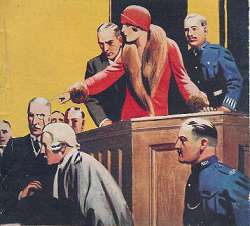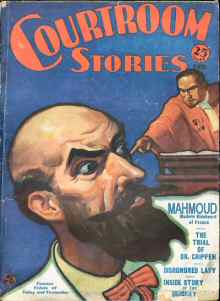More on Iranian connection to 9/11 - the defector now has a name - and a familiar one at that.
On what had been the eve of his widely expected acquittal, the trial of the second person charged by German authorities as an accomplice of the Sept. 11 hijackers was thrown into turmoil Wednesday after prosecutors disclosed the existence of a surprise witness purporting to link Iran to the hijackings. The mysterious witness, who goes by the name Hamid Reza Zakeri and claims to have been a longtime member of the Iranian intelligence service, is said to have told German investigators that the Sept. 11 plot represented what one termed a "joint venture" between the terrorist group al-Qaida and the Iranian government.
| That one's a show-stopper... |
Sources familiar with the witnessâ story, greeted with pronounced skepticism by some German intelligence officials, say he also implicates the defendant, a 31-year-old former Moroccan student named Abdelghani Mzoudi, as a knowledgeable participant in the hijacking plot. "If the story was true, the consequences would be remarkable," said one senior intelligence official, who observed that the witnessâ account comes nearly 2 1/2 years after Sept. 11, 2001, and "looks a little bit constructed."
| Almost tailored, in fact... |
Zakeri is not expected to appear in the high-security Hamburg courtroom Thursday, where officials of the German federal police, the BKA, have been summoned to explain why they believe Zakeriâs testimony is credible. Sabine Westphalen, a spokeswoman for the Higher Regional Court of Hamburg, said the five-judge panel that will decide Mzoudiâs fate had received a 30-page transcript of the BKAâs interview with Zakeri conducted within the past few days. Westphalen said the federal prosecutor had asked "to interrupt the hearing of evidence for 30 days in order to be able to examine the data of the witness and its reliability." No verdict is now expected before Jan. 29. The appeal to the court to consider Zakeriâs story amounts to a last-minute move by the chief German prosecutor, Kay Nehm, to preserve the fast-fading possibility of a conviction in what is likely to be the last trial in Germany of an alleged accomplice of the Sept. 11 hijackers.
| I can understand why the cops and the intel services would want to keep him from having to appear in court. Iranian involvement would be a political and diplomatic bombshell — the sort of thing you'd want to have every duck in a row for. If it turns out to be true, vast international repercussions; if the guy's a phony, egg all over everybody's face... |
In the first such trial, which concluded last year, another Moroccan student, Mounir al-Motassadeq, was sentenced to a maximum of 15 years in prison for aiding the Sept. 11 hijackers. Motassadeq admitted knowing some of the hijackers but denied any foreknowledge of the Sept. 11 plot, in which four airplane hijackings resulted in more than 3,000 deaths. Mzoudi has taken essentially the same stance. According to the German newsmagazine Der Spiegel, Zakeri reportedly said Mzoudi acted as the hijackersâ liaison with their al-Qaida support network. Until now, the case against Mzoudi has been entirely circumstantial, resting on evidence showing that he performed a number of logistical and "housekeeping" services for the principal hijackers, both before and after they left Hamburg to begin flying lessons in the U.S. The prosecutionâs theory, not supported by any direct evidence or testimony, is that Mzoudi must have known why Mohamed Atta and Marwan al-Shehhi, believed to have piloted the two hijacked jets that struck the World Trade Center, had quietly departed northern Germany for Florida. In December, however, the Hamburg court ordered Mzoudiâs release from prison after being informed by the BKA that a confessed Sept. 11 co-conspirator, Ramzi Binalshibh, had told U.S. intelligence agents that those who did know of the hijacking plot had "never talked to others about the true operations or the establishment of a terrorist cell" in Hamburg.
Any credible evidence linking Iran to Sept. 11 would have immediate and profound repercussions for U.S. relations with Iran and the Muslim world. Bush administration officials have included Iran with North Korea and the former Iraqi government of Saddam Hussein in what they term the "axis of evil." The Tribune reported last year that Shadi Abadallah, a 26-year-old Jordanian who said he served as one of Osama bin Ladenâs bodyguards in Afghanistan, previously told the BKA that one of the worldâs most-wanted terrorists, Abu Musab al-Zarqawi, described by Secretary of State Colin Powell as an "al-Qaida associate," was closely allied with the Iranian government. Zarqawi, a one-legged Jordanian national who heads the al-Tawhid terrorist network, which some U.S. officials say is linked to al-Qaida, has been accused by the Bush administration of helping al-Qaida develop plans to attack the West with radioactive and other weapons of mass destruction. American officials, who say Zarqawi is responsible for the assassination of a U.S. diplomat in Jordan, have placed a $5 million reward on his head.
Kenneth R. Timmerman, a senior writer for Washington-based Insight magazine, said he interviewed Hamid Zakeri during several telephone conversations last summer and that the man "told a very credible story." Timmerman said he had been able to corroborate a number of the physical details provided by Zakeri concerning such things as the physical layout of the Tehran headquarters of the Iranian Ministry of Information and Security, or MOIS. According to an article Timmerman published in July, Zakeri said that he worked for the Iraniansâ "supreme leader," Ayatollah Ali Khameini, and that he was present at two meetings between senior Iranian and al-Qaida officials in the months before Sept. 11. Timmerman said Zakeri had provided him a document purportedly signed by the Iranian intelligence chief, Hojjatoleslam Ali Akbar Nateq-Nouri, in May of 2001, ordering a strike at this countryâs "economic structure, their [sic] reputation and their internal peace and security." Because the Mzoudi case is still before the German court, the CIA declined to comment. |
 (Xinhua) -- Mounir al-Motassadeq, who was to be convicted for involvement in the Sept. 11, 2001 terrorist attacks in the United States, has filed an appeal to Germany's highest court against his upcoming sentencing hearing, court officials said on Friday.
(Xinhua) -- Mounir al-Motassadeq, who was to be convicted for involvement in the Sept. 11, 2001 terrorist attacks in the United States, has filed an appeal to Germany's highest court against his upcoming sentencing hearing, court officials said on Friday. 
 Germany's High Court is due Thursday to hear the appeal of
Germany's High Court is due Thursday to hear the appeal of  A Moroccan man who was friends with three of the 9/11 suicide hijackers has been found guilty in Germany of belonging to a terrorist organisation.
A Moroccan man who was friends with three of the 9/11 suicide hijackers has been found guilty in Germany of belonging to a terrorist organisation.  HAMBURG -
HAMBURG -